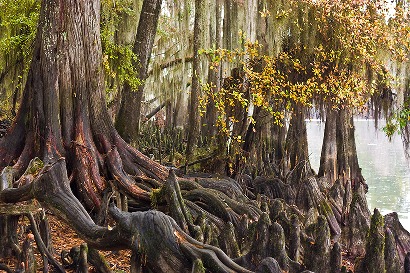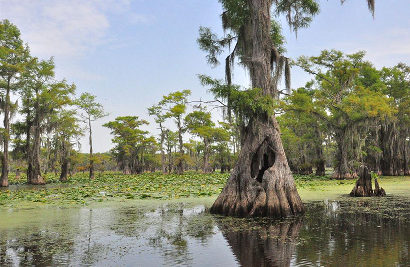|
|
Early
Spanish and French explorers of the piney woods of deep East
Texas didn't mention a large body of water in the area. They recounted
creeks, which the Spaniards usually called arroyos and the
French called bayous. They found and named rivers, and - for
the most part - the Spanish names of these rivers have survived, if
in somewhat dilapidated condition. The Brazos was originally El
Rio de los Brazos de Dios - The River of the Arms of God - and
the river we know today as the San Bernard was originally El Rio de
San Bernardo. The one thing neither the Spanish nor the French mentioned
was lakes.
In fact Texas did have three permanent
lakes, only one of which was of any appreciable size. Sabine Lake
is actually a landlocked, fresh-water bay. The other two lakes are
much smaller. One is Espantosa Lake near Crystal
City, which the Spanish knew well and feared. The word espantosa
means 'haunted in a particularly horrible way.' The other, which was
not discovered for many years, is Lost Lake or Hidden Lake,
high in the Davis Mountains. It appears to be a portion of an underground
river, the covering of which collapsed perhaps centuries, perhaps
millennia ago. It is only about a hundred yards long and perhaps twenty
wide, and at one time it was famous for the black bass it contained.
In
1811 one of the most powerful earthquakes in recorded history struck
the central portion of the North American continent, with an epicenter
near the town of New Madrid, Missouri. How powerful was it? It changed
the course of the Mississippi and made that great river run backwards
for three days, creating as a sort of afterthought Reelfoot Lake on
the present Kentucky-Tennessee state line. Churchbells rang in Augusta,
Georgia from the trembling of the ground, and brick chimneys fell
in Pittsburgh, Pennsylvania. It other words, as earthquakes go, it
was, as Mark Twain might have described it, a sockdolager.
One of the many, many effects of the earthquake and its aftershocks
- which lasted for three years - was a massive number of trees knocked
down all the way from Michigan and Wisconsin to the Mississippi's
delta in Louisiana. A lot of those trees went down in East
Texas.
On a creek tributary to the stream now called Cedar Bayou,
across the line in Louisiana, there was a beaver dam. Trees began
to pile up against that beaver dam, creating a logjam several miles
wide and several miles deep. Behind this logjam the waters of Cedar
Bayou began to collect, eventually forming a vast, though shallow,
lake in western Louisiana and East
Texas. American settlers in the area named it Caddo Lake
after the tribe native to the region. |
 |
Caddo
Lake was a godsend to trade in East
Texas. In an area of extensive rainfall what roads existed became
quagmires. However, rain merely assisted travel by water. First by
rowboat, then by sailboat, and eventually by steamboat, Caddo Lake
became the trade highway of East
Texas. The major port on Caddo Lake, right on the shore so the
steamboats could load and unload directly from the town, was Jefferson,
Texas. In 1861 Jefferson
was one of the most prosperous towns in Texas, shipping tons of cotton
down Caddo Lake to the logjam, where they were transported overland
a short distance to the Red River and then shipped down the Red to
the Mississippi, loaded onto seagoing ships at New Orleans, and then
shipped to Europe to be sold. Jefferson
even had a railroad. Ambitiously named Southern Pacific, Jefferson's
railroad was all of seven miles long, leading from the wharfs in Jefferson
back into the pines. It existed to supply cordwood for the boilers
of the Caddo Lake steamboats.
Everything went fine until 1874. Jefferson
became a tourist destination, and among the signatures in the Excelsior
House registration book is that of Roscoe Conklin. Though little remembered
today, Conklin was considered the finest orator of the second half
of the 19th Century. It was in that fateful year, so the story goes,
that diminutive railroad robber baron Jay Gould visited Jefferson.
He proposed to build a railroad in Jefferson
- and, or so the story goes, it was his intention to lay tracks directly
in the middle of the town's main commercial street.
Jefferson told
the miniature billionaire - Gould only stood about five feet tall
- that there was no way in the name of Perdition he was going to mar
their beautiful town by running trains down its main street. Gould
wrote "The end of Jefferson!"
in the Excelsior House's registration book and left.
Those who study Gould's career insist he never set foot in Jefferson,
Texas, in his life. Be that as it may, somebody wrote "The
end of Jefferson!" in the Excelsior House's book, and shortly afterward
Jefferson almost
did end. For reasons unexplained to this day, the US Army's Corps
of Engineers dynamited the logjam at the end of Caddo Lake, and in
less than a week Jefferson
was left-well, hardly high and more soggy than dry, but without its
main source of commerce. Jefferson
very nearly did die.
In
the early 1950s, when my parents and I were returning to Austin
from a trip to Athens
to visit my mother's parents, I asked my father to take me to Caddo
Lake, a place I'd read much about. "There's no Caddo Lake any more,
son," he said. "There's not much there but a mudhole, and not much
of a mudhole at that."
There the situation remained until the great water-impoundment frenzy
of the late '50s and early '60s, in the wake of the Great Drought
of the 1950s. A concrete dam was erected on Cedar Bayou in Louisiana,
and once again a fairly large, shallow body of water was impounded
behind it. First known as New Caddo Lake, this
artificial impoundment is today, for the most part, simply called
Caddo Lake. |
 |
Jefferson
is still where it was, though the remains of the wharfs that once
docked steamboats are a long way from the shore of the present Caddo
Lake. It does have a railroad - the Kansas City Southern - though
the rails don't run down Main Street. Jefferson exploits its past,
and has acquired Atalanta, Jay Gould's private railroad car
named for a Greek goddess. It, along with Excelsior House and much
else, is exploited for tourism.
Yes, Texas once more has a Caddo Lake
- but for those familiar with the historic Caddo Lake, it is but a
pale imitation.
© C. F.
Eckhardt
"Charley Eckhardt's Texas"May
12, 2006 column |
|
|
